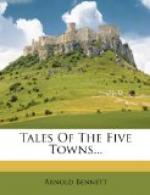Mr. Curtenty got his fourteen intelligences safely across the top of St. Luke’s Square, and gently urged them into the steep defile of Oldcastle Street. By this time rumour had passed in front of him and run off down side-streets like water let into an irrigation system. At every corner was a knot of people, at most windows a face. And the Deputy-Mayor never spoke nor smiled. The farce was enormous; the memory of it would survive revolutions and religions.
Halfway down Oldcastle Street the first disaster happened. Electric tramways had not then knitted the Five Towns in a network of steel; but the last word of civilization and refinement was about to be uttered, and a gang of men were making patterns with wires on the skyscape of Oldcastle Street. One of the wires, slipping from its temporary gripper, swirled with an extraordinary sound into the roadway, and writhed there in spirals. Several of Mr. Curtenty’s geese were knocked down, and rose obviously annoyed; but the Barnacle gander fell with a clinging circle of wire round his muscular, glossy neck, and did not rise again. It was a violent, mysterious, agonizing, and sudden death for him, and must have confirmed his theories about the arbitrariness of things. The thirteen passed pitilessly on. Mr. Curtenty freed the gander from the coiling wire, and picked it up, but, finding it far too heavy to carry, he handed it to a Corporation road-sweeper.
‘I’ll send for it,’ he said; ‘wait here.’
These were the only words uttered by him during a memorable journey.
The second disaster was that the deceitful afternoon turned to rain—cold, cruel rain, persistent rain, full of sinister significance. Mr. Curtenty ruefully raised the velvet of his Melton. As he did so a brougham rolled into Oldcastle Street, a little in front of him, from the direction of St. Peter’s Church, and vanished towards Hillport. He knew the carriage; he had bought it and paid for it. Deep, far down, in his mind stirred the thought:




